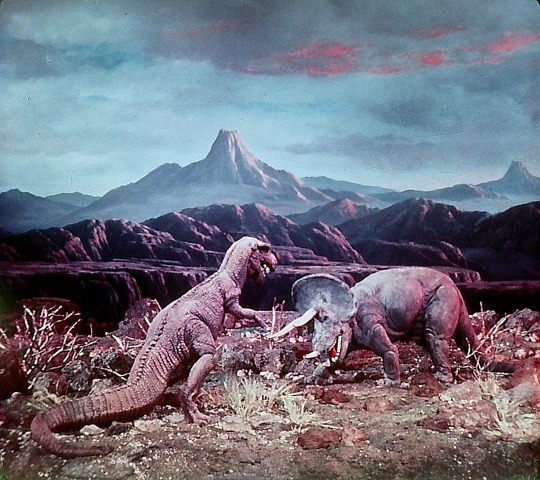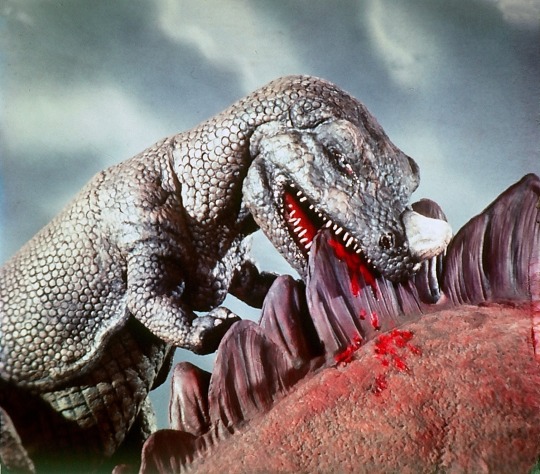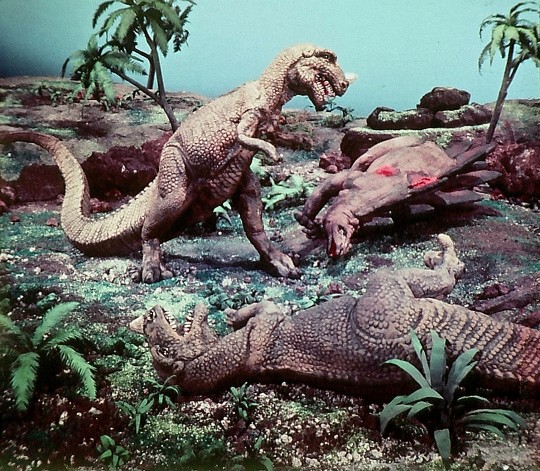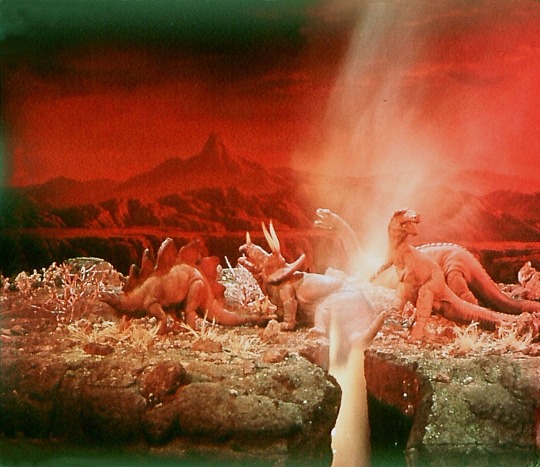Text
i think of this ProZD video constantly its always so fucking funny
100K notes
·
View notes
Note
I’m interested in knowing your in-depth thoughts on Legacy of Monsters, its characters (including the monsters), and what you want to see out of season 2.
Overall I liked it plenty. The flashbacks were probably my favorite part - as the two novels I've written about it would suggest, I'm a sucker for kaiju stories set in the cold war. Also goddamn, I've known Kurt Russel is a quality actor since seeing The Thing in my teens, but it still astounds me how he hits the material he's given right out of the park.
I will admit that the "unravel the conspiracies of Monarch" plot was a lot less interesting to me. I'm just not the audience for conspiracy stuff, much as I'm not the audience for spy stuff. I had more fun with the monster scenes and the plucky trio of misfits trying to keep the world from waging war against animals that embody natural forces.
The thing I'd want changes for season 2 would be "don't make the plot about untangling a big messy conspiracy," but, like, that's such a defining thing about Monarch in the Monsterverse, so I don't really think we can escape it. And of course I'd love to see more monsters, especially if we have more moments of them acting like animals - my favorite bits in the series were when Godzilla and pals were just existing rather than purposely menacing people, like the one episode where the big setpiece is Godzilla waking up from a nap and shaking off the dirt before harmlessly lumbering away. Give me more of that shit, I love it.
3 notes
·
View notes
Note
One more addition!
Hey, you know Puss In Boots: The Last Wish - that excellent animated film that's pretty much universally praised? One of the really unique aspects of it is that it has three main antagonists, a rarity for an animated children's film, and rarer still, it makes all three work without ever dragging or muddling the story up. And each of those antagonists plays with the concept of villainy.
You have Goldilocks, a selfish but sympathetic woman who opposes our heroes because she wants the wish they're after for herself, but for the very understandable reason of wanting to use it to find her family. You have Jack Horner, a gleefully evil and selfish man who explicitly wants the wish to give himself everything at the expense of everyone else. Finally, you have Death itself - not figuratively or metaphorically or rhetorically or any other fancy way, just the concept of Death personified - who wants to kill the titular feline hero. Or, summarized in regards to their flavor of villainy:
a sympathetic antagonist with villainous actions but good intentions
an utterly unsympathetic and one-dimensional antagonist whose villainy is so over-the-top it becomes comedic
a terrifying and no-nonsense antagonist who wants to murder the hero dead
And what makes these three work is how they all serve as foils our hero, Puss in Boots, who's arc is about 1. what being a hero actually means and 2. what it actually means to live a good life. Puss has done spectacular, impossible, foolhardy things, and now, with Death looming over him, he's desperate to extend his life so he can keep doing so - while at the same time running from the people who could make his life actually worthwhile.
He benefits from a sympathetic villain like Goldilocks to compare to, as she also pursues something she doesn't really need while ignoring the good things she already has, and like Puss, there's hope for her to change her act.
You need a cartoonishly awful villain like Jack to show what the unfettered selfishness Puss is tempted to pursue leads to.
And you need a terrifying and insurmountable villain like Death to make the stakes real, and to call Puss on his bullshit the way the other two villains can't without being hypocrites.
They are all three very different takes on villainy, and allow the story to deftly explore what it means to be a hero AND what it means to be a villain at the same time, and also what it means to just be a person, flawed and limited but still important. Three very different modes of villainy, all equally valid and important to the story. Why should we settle for just one?
While we’re on the subject of characters who “make you truly question makes one villainous”, what do you think of the take that villains, or at least ‘true’ villains, shouldn’t be sympathetic at all. That villains should simply be motivated by petty selfishness and cruelty. On one hand, that doesn’t sound like it makes for compelling stories, but on the other… most real-life villains really are motivated by nothing but greed and selfishness. And gain power by making people sympathize with them.
"Villain" is a word that has a lot of nuance to it that people in turn tend to overlook in favor of reducing it to "the guy it's ok to hate." "Antagonist" has the same problem, perhaps even worse, but that's another conversation.
Definitions don't help because more often than not they end up being intensely reductive of the broad scope of meanings the word has - again, another word with a similar problem in this regard is "monster," which can mean a bunch of a very different things that are all nonetheless recognizable by bearing some element of "monstrosity" to them.
So, like, one valid definition of villain is "an evil and unsympathetic character the audience is meant to hate." And I imagine if you gave that definition to most people, they'd agree - until you get to sympathetic characters who are still unmistakably villains. Like, would anyone say the word "villain" shouldn't include people like Doctor Octopus in Spider-Man II, or Mr. Freeze in Batman the Animated Series? Is Shakespeare's Macbeth excluded from the realm of villains because the play hinges on us finding ways to sympathize with him despite the horrific evil of his actions? Is Milton's Satan, perhaps the most iconic take on The Devil Himself, excluded from the conversation because Milton gave him pathos?
Villainy can be about the nature of your actions, and it can be about your relationship with society, and it can be about your choice of fashion and hobbies. It can be all of these things or none of them. Villainy is a form of being othered, one that has so many tropes attached to it and folded under it that the aesthetics of it can be divorced from the morality assigned to them easily. Villainy is so vast and complex a concept that a story can analyze it from a dozen different angels and still not capture the full scope of it.
Or, as one movie on the subject put it so succinctly:
youtube
It's about presentation.
As a writer and a reader of fiction, I love looking at time-tested tropes from a lot of different angles, and prying them apart to see how they work, and then seeing how far they can bend and twist until they break and become something else. I think locking yourself into one simple definition of what a villain can be is very limiting, creatively speaking, and think it's far more interesting to explore the concept from different angles. There's room for simple, pure evil bastards, sure, but there's also room for multifaceted evils, or characters will all the trappings of a villain but actions that ultimately speak to a nobility of spirit others have overlooked. The complexity of the trope is beautiful, why not explore it?
52 notes
·
View notes
Note
What are your thoughts on Hordak’s and Catra’s respective redemption arcs? Cause’ I’ve seen both of those get fair amounts of backlash. I recall someone saying “ Hordak’s upbringing cannot excuse his actions.” Another described Catra’s relationship with Adora as “fetishized abuse.” Your thoughts on this backlash?
My legal team informs me that I cannot under any circumstances discuss She-Ra and the Princesses of Power, given that an innocuous post I made while liveblogging the first season resulted in perhaps the Worst Tumblr Drama I've Ever Experienced.
10 notes
·
View notes
Text
Just saw a post about dolls and how kids play with them, and I remembered that my grandpa, who had real bad alzhiemer's, would buy me and my sisters the same dolls from the dollar store every Friday. It had became a routine for him, and he forgot that he'd already gotten us those toys
So that led to us having a shitton of super cheap barbie knock offs, and my parents could only sneakily return so many
We also had a shitty row boat, because my dad has really bad adhd and no impulse control. He also had no idea how to keep a boat, which meant it immediately filled up nearly to the brim with rain water as it sat next to our driveway for seasons unused
So what's a kid to do with dozens of unwanted barbies and what is basically an above ground pond at this point? I'll tell you
What you do is take those dolls and stick them in the boat very carefully. Then you watch as the seasons change, the temperature gets colder, and the water in the boat freezes as winter takes hold.
You never really forget bringing your mom out to the boat in the dead of winter to show off the homemade river Styx her children have crafted in the backyard, a dozen cheaply made plastic monstrosities carefully positioned to reach up to the surface in a frozen agony
Those dolls stayed in their frozen hell until we finally found someone who would buy the boat, like two years later.
Unfortunately, I cannot remember what the guy's reaction was when he actually came to see it and witnessed the art installation inside
9K notes
·
View notes
Photo
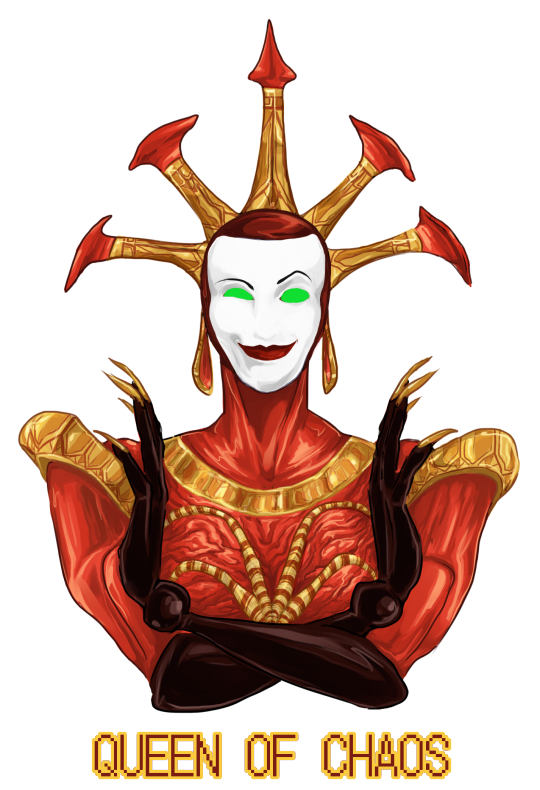

Hexy dexy decimal~
how i love you so, my queen~
she’s was fun, i love how she came out too~
she is also on a shirt HERE
196 notes
·
View notes
Note
Also - and I realize this is going to sound very uncharitable of me to say - I think when people angrily argue that they want more one-dimensional, pure evil, unsympathetic villains, what they're ultimately saying is "I don't want the stories I read to have a more complex morality than a Goofus and Gallant comic strip." And, personally, I think that's a demand that should be challenged.
It's not that I can't see where the desire for that comes from. Humans are wired to have an ingroup/outgroup mentality, where the ingroup is good and worthy of consideration and care, and the outgroup is evil and unworthy of compassion or pity. It's a survival thing - if you feel compassion for the deer you're hunting, or for the lion that's hunting you, then you'll struggle to kill it when you need to, and that could end with you dying. To survive, our ancestors had to categorize things as "worthy of protection" and "deserving of death." We are wired to sort things into Gallants and Goofuses.
And it's not like there aren't people who've done everything they can to prove they're worthy of the outgroup label! I'm an American who lived through the Trump presidency, and hot damn did that man do everything in his power to prove he was the most incompetent, cruel, and needlessly evil person ever to hold the office - and given the presidents we've had, given the fact that I also lived through two fucking terms of George W Bush, I think that is saying quite a lot! If there was a Goofus living in this world, that incoherent windbag would be it. Pure, simple, one-dimensional evil in human form.
...but...
Despite what our brains want us to think, and what thousands of years of human civilization have often tried to codify and confirm through legends and superstition and hatchet job histories, the world was not designed with ingroups and outgroups in mind. People were not made in two batches, one good and one evil. There is no inherent original sin, no cursed at birth people.
The reality is that all people, even the most monstrous, are a collection of experiences, including trauma and anxiety. They had choices in how they reacted to those experiences, moments of agency, but they also had things out of their control. You think Donald Trump was raised by a loving, compassionate family who tried to teach him right from wrong, or do you think he was raised by a family of cold-hearted, greedy bastards who taught him other people are only worth the money you can squeeze out of them? We all like to think that, given the circumstances of the lives of people we hate, we'd turn out better, but do we know that for sure? Are we so certain of our own virtue that we can cast those stones without pause?
I don't exclude myself from this when I say all humans are wired for a Goofus and Gallant mindset. When some asshole almost sideswipes me on the road because they didn't check their mirrors while making a lane change and relied on my shitty reflexes to keep us from harm, I don't think, "Well, maybe they're tired or have gone through some personal tragedy and just had a brief moment of broken concentration." No, my immediate reaction is, "What the fuck is wrong with this asshole? This fucking goofus almost killed me! Get off the road, you dumb piece of shit!" Because when your life is threatened, you go into survival mode, and survival is about Goofuses and Gallants.
But when I have a moment of lapsed concentration because I'm tired or am dealing with melancholy or whatever other shit might be gnawing at my mind, and I accidentally cut someone off and they honk the horn, am I acting out of malice? No! And I feel bad for that lapse, that mistake. Isn't it more likely the driver who cut me off is like me? That they're not some Goofus fucking things up on purpose, but a human, fallible and flawed and doing their best but occasionally failing and fucking up without meaning to?
Villains can be a Goofus in a narrative, but they can also be, you know, us. The us the fucks up, the us that meant well but crashed into someone's car because their friend was leaving for L.A. and they were going to be all alone now because everyone they loved was moving to find careers and they were driving home at 3am in tears and didn't notice the other car at the four way stop. Or they can be the teenager driving her dad's big SUV who rear-ends your car as you're on your way home from work, who didn't want to crash but is still learning how to drive and is terrified that the thirty year old man stepping out of the car she crashed into is going to yell at her or even get violent. Villains can be people - people we want to write off as irredeemable because of their actions or even just appearances, but who can teach us a valuable lesson in empathy if we explore why they are what they are and what led them to do what they do.
There's a value in a villain as a Goofus, but there's also a value to villains who are more than that. And, personally, I think it's healthy if we have fiction that challenges us not to sort people into outgroups and ingroups, not to write off every person who fucks up as irredeemable, not to slide into the comfortable mindset that everyone who comes into conflict with you is Evil and Deserving of Death. Because you know what kind of people live in a world where everyone is either a Goofus or a Gallant?
Those goddamn Goofuses, that's who. Those dumb, evil, Trump-supporting Goofuses.
While we’re on the subject of characters who “make you truly question makes one villainous”, what do you think of the take that villains, or at least ‘true’ villains, shouldn’t be sympathetic at all. That villains should simply be motivated by petty selfishness and cruelty. On one hand, that doesn’t sound like it makes for compelling stories, but on the other… most real-life villains really are motivated by nothing but greed and selfishness. And gain power by making people sympathize with them.
"Villain" is a word that has a lot of nuance to it that people in turn tend to overlook in favor of reducing it to "the guy it's ok to hate." "Antagonist" has the same problem, perhaps even worse, but that's another conversation.
Definitions don't help because more often than not they end up being intensely reductive of the broad scope of meanings the word has - again, another word with a similar problem in this regard is "monster," which can mean a bunch of a very different things that are all nonetheless recognizable by bearing some element of "monstrosity" to them.
So, like, one valid definition of villain is "an evil and unsympathetic character the audience is meant to hate." And I imagine if you gave that definition to most people, they'd agree - until you get to sympathetic characters who are still unmistakably villains. Like, would anyone say the word "villain" shouldn't include people like Doctor Octopus in Spider-Man II, or Mr. Freeze in Batman the Animated Series? Is Shakespeare's Macbeth excluded from the realm of villains because the play hinges on us finding ways to sympathize with him despite the horrific evil of his actions? Is Milton's Satan, perhaps the most iconic take on The Devil Himself, excluded from the conversation because Milton gave him pathos?
Villainy can be about the nature of your actions, and it can be about your relationship with society, and it can be about your choice of fashion and hobbies. It can be all of these things or none of them. Villainy is a form of being othered, one that has so many tropes attached to it and folded under it that the aesthetics of it can be divorced from the morality assigned to them easily. Villainy is so vast and complex a concept that a story can analyze it from a dozen different angels and still not capture the full scope of it.
Or, as one movie on the subject put it so succinctly:
youtube
It's about presentation.
As a writer and a reader of fiction, I love looking at time-tested tropes from a lot of different angles, and prying them apart to see how they work, and then seeing how far they can bend and twist until they break and become something else. I think locking yourself into one simple definition of what a villain can be is very limiting, creatively speaking, and think it's far more interesting to explore the concept from different angles. There's room for simple, pure evil bastards, sure, but there's also room for multifaceted evils, or characters will all the trappings of a villain but actions that ultimately speak to a nobility of spirit others have overlooked. The complexity of the trope is beautiful, why not explore it?
52 notes
·
View notes
Text
This is what posting your artwork after a mutual posts a big life update feels like

56K notes
·
View notes
Note
While we’re on the subject of characters who “make you truly question makes one villainous”, what do you think of the take that villains, or at least ‘true’ villains, shouldn’t be sympathetic at all. That villains should simply be motivated by petty selfishness and cruelty. On one hand, that doesn’t sound like it makes for compelling stories, but on the other… most real-life villains really are motivated by nothing but greed and selfishness. And gain power by making people sympathize with them.
"Villain" is a word that has a lot of nuance to it that people in turn tend to overlook in favor of reducing it to "the guy it's ok to hate." "Antagonist" has the same problem, perhaps even worse, but that's another conversation.
Definitions don't help because more often than not they end up being intensely reductive of the broad scope of meanings the word has - again, another word with a similar problem in this regard is "monster," which can mean a bunch of a very different things that are all nonetheless recognizable by bearing some element of "monstrosity" to them.
So, like, one valid definition of villain is "an evil and unsympathetic character the audience is meant to hate." And I imagine if you gave that definition to most people, they'd agree - until you get to sympathetic characters who are still unmistakably villains. Like, would anyone say the word "villain" shouldn't include people like Doctor Octopus in Spider-Man II, or Mr. Freeze in Batman the Animated Series? Is Shakespeare's Macbeth excluded from the realm of villains because the play hinges on us finding ways to sympathize with him despite the horrific evil of his actions? Is Milton's Satan, perhaps the most iconic take on The Devil Himself, excluded from the conversation because Milton gave him pathos?
Villainy can be about the nature of your actions, and it can be about your relationship with society, and it can be about your choice of fashion and hobbies. It can be all of these things or none of them. Villainy is a form of being othered, one that has so many tropes attached to it and folded under it that the aesthetics of it can be divorced from the morality assigned to them easily. Villainy is so vast and complex a concept that a story can analyze it from a dozen different angels and still not capture the full scope of it.
Or, as one movie on the subject put it so succinctly:
youtube
It's about presentation.
As a writer and a reader of fiction, I love looking at time-tested tropes from a lot of different angles, and prying them apart to see how they work, and then seeing how far they can bend and twist until they break and become something else. I think locking yourself into one simple definition of what a villain can be is very limiting, creatively speaking, and think it's far more interesting to explore the concept from different angles. There's room for simple, pure evil bastards, sure, but there's also room for multifaceted evils, or characters will all the trappings of a villain but actions that ultimately speak to a nobility of spirit others have overlooked. The complexity of the trope is beautiful, why not explore it?
52 notes
·
View notes
Video
62K notes
·
View notes
Note
Who is your favorite Nintendo villain (Bowser, Ganondorf, Dedede, Ridley, King K. Krool, etc.) and why?
I feel like the snarky "aren't I clever?" answer would be to say Edelgard from Fire Emblem Three Houses, because that's a Nintendo game from a Nintendo franchise, and while Edelgard is more morally complicated than the "villain" label would suggest, she nonetheless is designed to be villain-coded both in general and by the very specific tropes and archetypes that Fire Emblem itself has developed. And since Edelgard is one of my favorite character of all time AND plays with the concept of villainy in so many different ways depending on all the different routes you can take in the game, she'd be my favorite villain character from a Nintendo franchise - because my favorite villains are the ones who take the coding of villains in culture and make you question what truly makes one villainous.
But I'm going to assume the intent of this question is, like, less obscure villains, villains who'd appear in Nintendo branding. Smash Bros and Mario Cart villains, right?
In which case my answer would be Bowser. I love how he evolved from a very simple and basic villain concept - big fire-breathing dragon who steals a princess - into something a lot weirder and more specific, both in appearance and especially personality. Bowser is one of my favorite examples of a villain from children's media and specifically a recurring villain from children's media, because like the best villains of that specific subsection of culture, he's ultimately less a true evil doer and more a metaphor for a temperamental and antisocial kid on the playground. He's selfish and throws tantrums and acts rude, but he's not genuinely wicked - he is, in his own misguided way, seeking out a social connection with others. There's something deeply pitiable and even lovable about Bowser - we all have our days where we want to stamp our feet and shoot fire out our mouth in frustration, or wish we could just tell everyone to fuck off as we take what we want. We shouldn't, of course, but we all feel that way, and Bowser shows us both why we shouldn't and, more importantly, why having those monster-moments doesn't mean we're beyond turning over a new leaf.
Because yeah, Bowser may be a jerk who causes problems on purpose, but no one really hates him. Mario and the gang still invite him to play board games and participate in their go-kart races. He is, in a weird way, as much their friend as their enemy, and that's wonderful. And, in its own very simple way, this makes you ask the question: what truly makes someone villainous? Because if the big fire-breathing princess-kidnapping monster can have a good guy deep down beneath the scales and the bluster, then can we really write anyone off as just evil?
Also Bowser looks cool as hell.
34 notes
·
View notes
Text
656 notes
·
View notes
Note
Red Guy.
Who is your favorite Don’t Hug Me I’m Scared character? Mine would probably be Duck! 🦆
The Computery Guy
10 notes
·
View notes




